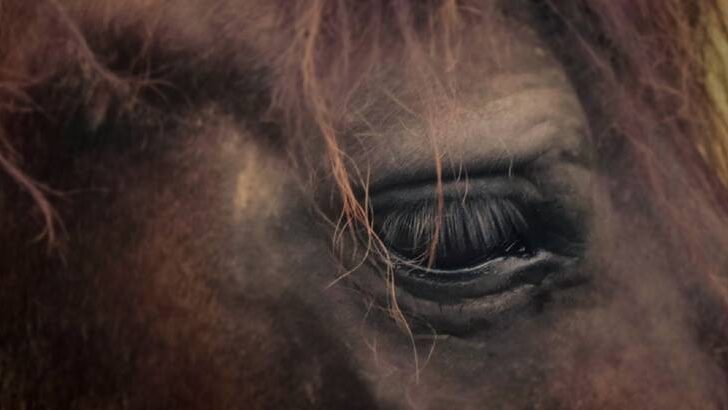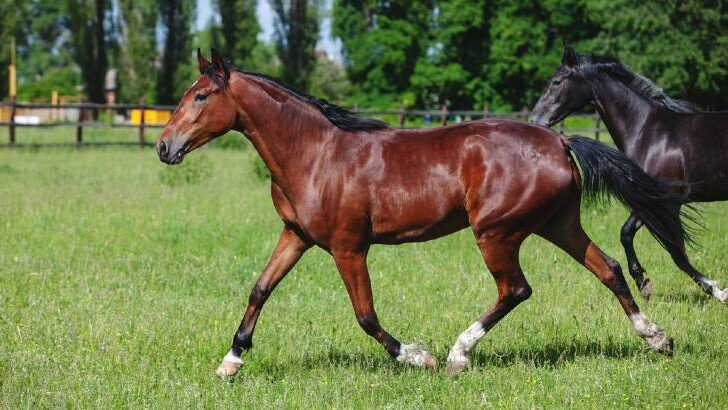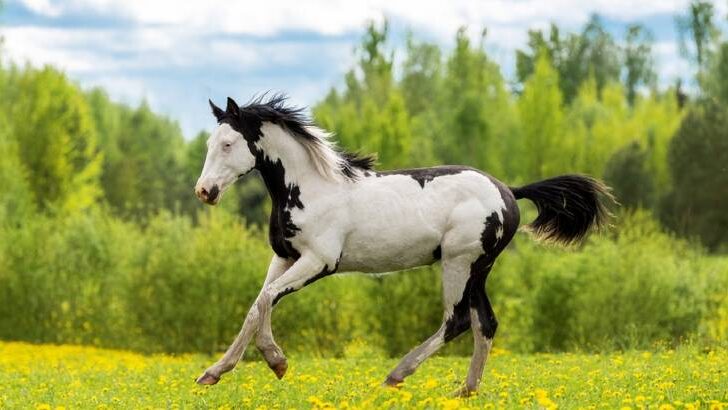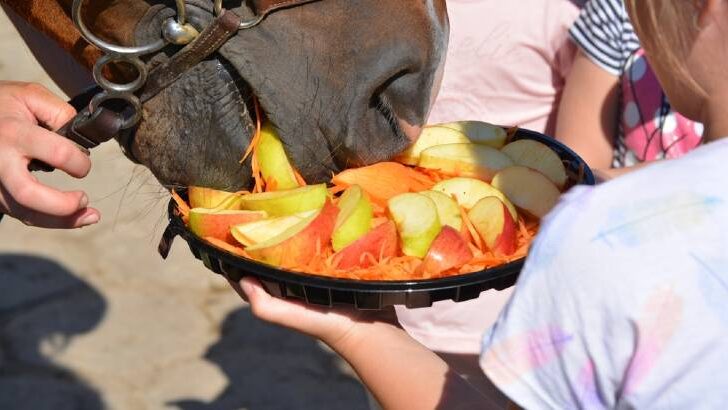Affiliate Disclaimer
As an Amazon Associate I earn from qualifying purchases. It helps me keep the website going. Thank you for your support.
Dealing with the passing of a pet is never easy. When it’s a much-loved equine, there are also many other things to consider, such as dealing with the body, which can make it just a bit harder. However, amidst the grief, it’s interesting to wonder whether or not horses know when they are going to die.
As it turns out, researchers have in fact delved into the field of equine cognition to determine whether horses do have a sense of their impending death. We know that many horses naturally nearing the end of their lives develop certain behaviors. They stop eating and drinking, may become more isolated from the herd, and appear depressed.
EEG (electroencephalography) recordings on end-of-life horses have also found their brainwaves change as they approach death. However, whether this means they’re conscious of their impending demise is still very much open to debate.
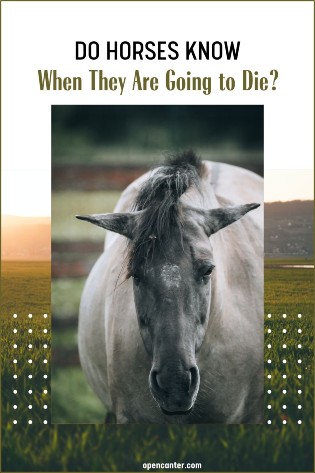
Do Horses Know What It Means to Die?
Where horses do seem to understand death is when they see it. Researchers have studied horses’ responses to dying companions and it appears they do often understand, or sense, that something is going on.
For example, they’ve found that horses may stand close to the ailing individual and nuzzle them, or even lie down with them. Horses have also been observed standing around a terminally ill paddock mate as though silently saying their farewells before wandering off to go about their day.
The author has also observed a case where a 6-month-old foal was in a yard with his dam when she suddenly passed away. By the time they were found – an hour or 2 later – he had already ‘figured out’ she was ‘gone’ and was quite happy to leave the yard to be with his other paddock buddies.
He did call out a few times during the following 24 hours but generally seemed to accept his mum was no longer there. Interestingly however he did subsequently form an intense bond with his older full sibling when she took him under her wing.
But does this mean they ‘understand’ death in the same way we do?
While they usually grasp that there has been an unusual event, it’s unlikely they have the same level of comprehension about death that we do. Ultimately though – does this distinction truly matter? They know ‘something’ has happened, they accept it, and in most cases, move on.
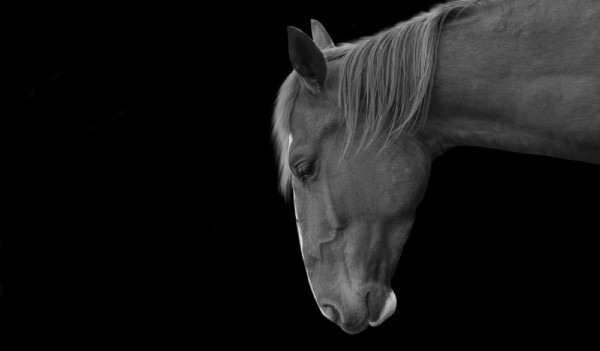
Horses Can Feel Intense Emotions
Horses, like humans, do have the capacity to experience intense emotional pain and distress when they lose a companion. They may, for example, exhibit symptoms of depression, stop eating, spend hours running around and calling out for their friend, or refuse to move from where they last saw their buddy.
However, as we know, horses do have a tendency to get distressed regardless of when a close buddy disappears, however, it happens. The buddy could be sold, moved to a new boarding facility, moved to another paddock, or even just taken away for a ride.
It could therefore be argued that this type of ‘distressed’ behavior is more about the sudden severance of the bond, and disappearance of the buddy rather than a comprehension of death per se.
Horses Rely on Herd Members For Safety And Security
These arguments particularly make sense when you consider that horses are herd animals. They instinctively form attachments and rely on the presence of other herd members for security and safety.
When a bond is suddenly broken due to the removal of an individual (however that happens), it can have a profound impact on their psychological well-being and sense of security. For a prey species, this can be extremely traumatic and psychologically distressing.
Helping Horses Deal With Death
From experience, one of the best ways to help horses accept a buddy has died is to leave them with the body for a while if possible. It’s actually surprising how well they do accept the situation when they’re given time to understand and accept their buddy has gone (source).
Having other buddies also helps them cope; in fact, leaving a horse on its own after its close buddy passes can lead to long-term distress and not just because they’ve lost a buddy.
Horses are herd animals, and if there are only 2 of them in a ‘herd’ and one is ‘taken away’, you’re essentially compounding their emotional trauma by removing their sense of ‘security in numbers’.
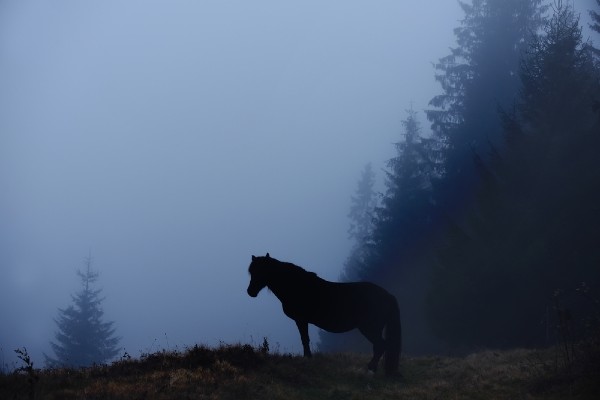
Can Science Tells Us If Horses Know When They Are Going To Die
So… we know horses do have some cognition about death when they see it and that tests indicate their brain waves appear to change as they themselves are dying. Further to these, they can also display a range of symptoms that tell us they may be getting close to the end of their lives, such as:
- Disinterest in food and water
- Lethargy and weakness
- Difficulty getting up
- Difficulty breathing
- Drop in body temperature
- Heart rate slows
- Bladder and bowel function changes
- Difficulty maintaining condition even when still eating well
However, these are symptoms of a range of other health disorders as well, some of which are not necessarily terminal.
A horse with colic for example will stop eating and drinking, and experience bladder and bowel changes. However, serious though it is, most colic cases are treatable and don’t normally result in death unless complications develop.
So the question is – can horses suffering from these symptoms tell the difference between those temporarily brought on by illness, and those caused by organ failure? Do horses know when they are going to die from something, and when they’re not?
Factors That May Affect Whether Horses Know When They Are Going To Die
Several factors could perhaps influence a horse’s awareness of death in these circumstances. These factors include their age, health condition, environment (natural or domesticated), the circumstances surrounding the event, and their relationship with the people around them.
A horse that’s getting old for example definitely knows it’s harder to get up after a lie-down (which is why many old horses stop lying down). They know they’re more vulnerable to predators when they’re down, and horses instinctively try to hide vulnerability. But do they associate the deterioration with the natural process of dying?
Scientifically, we really don’t know. Anecdotally – many owners say they do. Realistically though… by the time a horse reaches the stage where it can’t get up easily, isn’t eating and drinking properly, or is losing weight despite still eating normally, it will be uncomfortable and living with a degree of pain.
One has to think then that their focus will be centered on coping with that rather than on thinking about death…
Further to this – horses have a highly developed awareness of their bodies and surroundings. They have acute hearing, an exceptional sense of smell, and can recognize faces, read emotions, and remember things.
They can certainly pick up on the behavior and emotions of people around them, which means they will recognize that ‘something’ is going on. However, do they comprehend the exact nature of the situation?
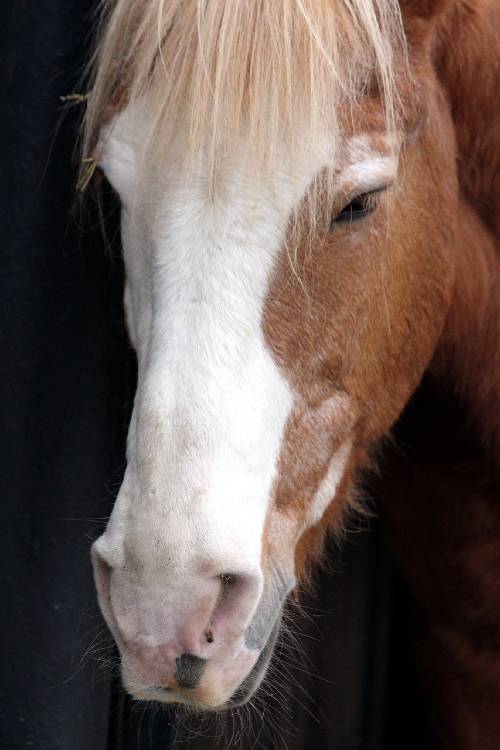
Examining Whether Horses Know When They Are Going to Die
There’s also the idea that horses might consciously shut themselves down… will themselves to die… resulting in the symptoms of approaching death.
However, these are all natural signs of advanced age. They occur across multiple species, including humans… Furthermore, there’s little scientific evidence to suggest horses deliberately sabotage their health like this when they ‘know they are going to die’.
Body organs simply stop working properly as they age, which in turn impacts associated bodily functions. For example, a horse that stops eating and drinking very likely isn’t doing it because it ‘wants’ to die.
Rather, it is probably experiencing renal failure, colic, or any one of a number of conditions that make horses not want to drink and eat. Whether or not it is actually aware that it’s approaching death though is debatable.
Horses will also be unaware they’re dying when it happens suddenly and unexpectedly, such as through an accident, an illness like severe colic or endotoxemia, or a venomous snakebite.
Can Evolution Influence A Horse’s Perception Of Its Death?
It’s also possible that a horse’s perception that their time is up is influenced by evolution. An old or sick horse can’t move as fast and may attract predators. That in turn endangers the rest of the herd.
Old and sick horses have in fact been observed going off by themselves, so it’s interesting to speculate if this is an instinctive instinct to avoid attracting predators to the herd.
It may also be because they’re stiff, sore, tired, and just want to be left alone in peace! So, they instinctively seek out a quiet spot under a tree or in some scrub somewhere.
Do they know they are going to die? Again, without knowing how horses interpret death, it’s impossible to know. However, this is one of the situations where it’s possible they do.
Final Thoughts
Do horses know when they are going to die? They do seem to comprehend something is happening when they ‘see’ a paddock mate passing. But… do they have some sort of sixth sense that tells them when they’re approaching the end of their life themselves? In some cases, perhaps… but the reality is that we really don’t know.

